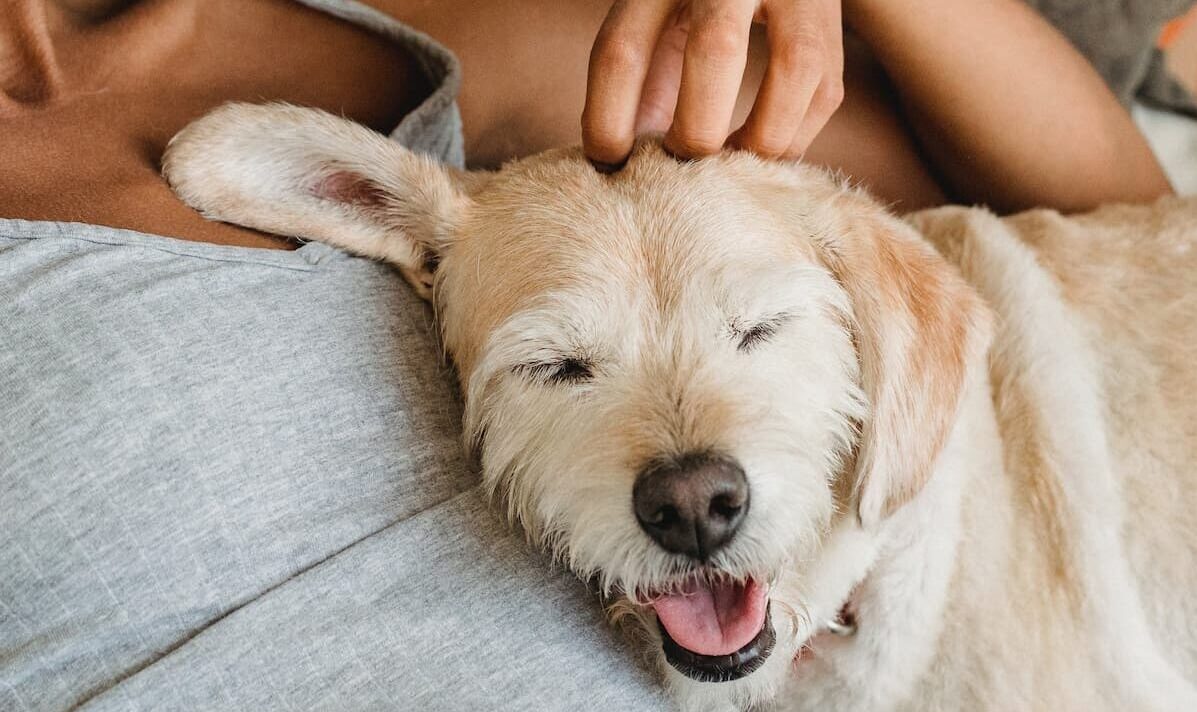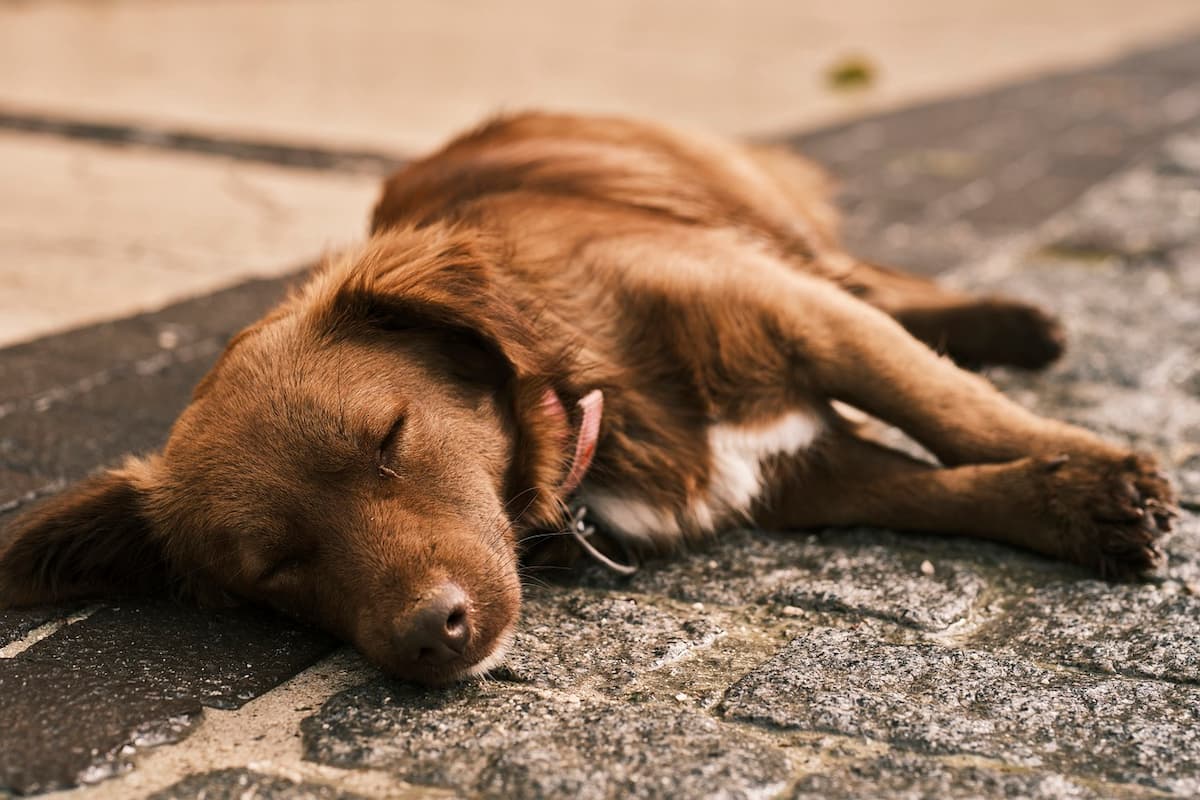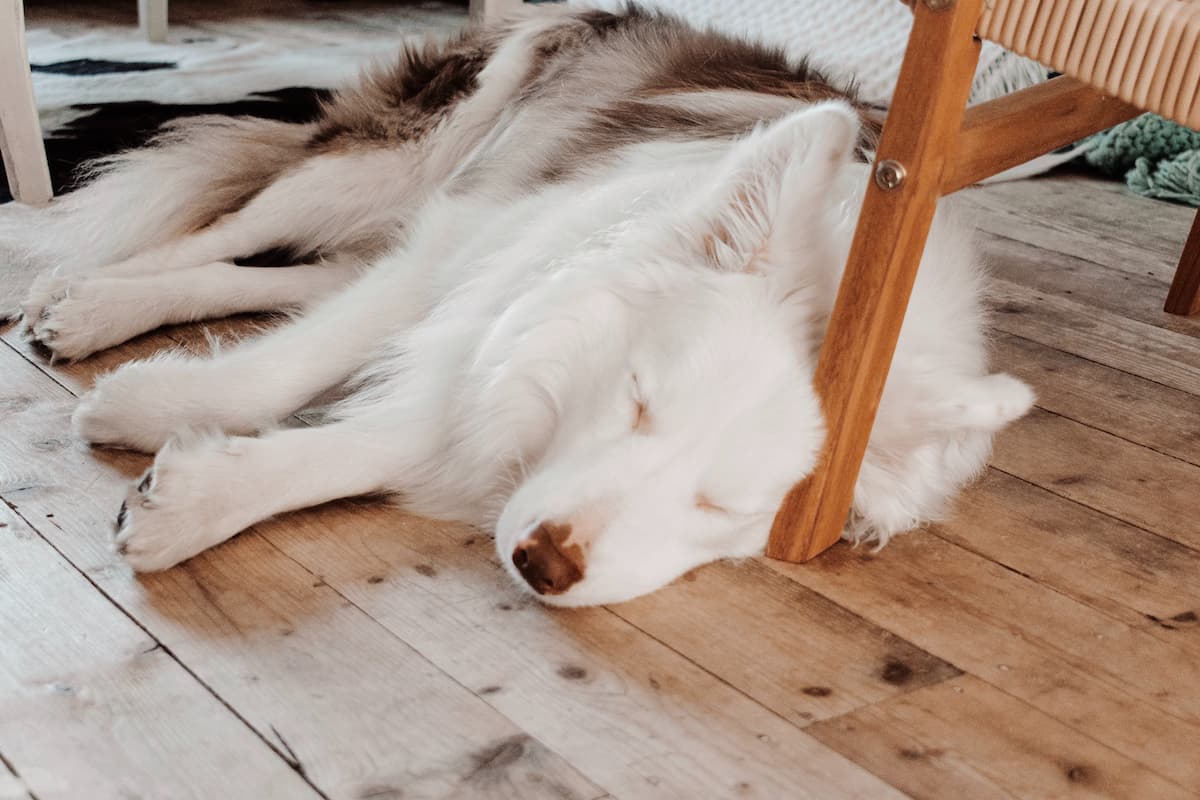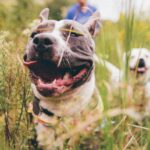Imagine having a nice sleep until you’re roused from your slumber by the sound of your dog’s panting.
Have you ever wondered what is responsible for your pup’s nocturnal panting?
Read on to find out.
Why Dogs Pant Heavily at Night?
Is your dog panting heavily at night?
Don’t worry, you’re not alone!
Many dog owners have noticed their furry friends displaying this behavior and wonder why it happens.
Dogs can pant for a variety of reasons, and nighttime panting can sometimes be a cause for concern.
Here are some potential reasons why your dog may be panting heavily during the night:
Overheating: Dogs regulate their body temperature through panting, so if your pup is feeling too warm during the night, heavy panting can be a way for them to cool down.
Make sure to provide your dog with a comfortable sleeping environment and consider adjusting the room temperature to keep them cool.
Anxiety or Stress: Just like humans, dogs can experience anxiety or stress, which may manifest through heavy panting at night.
Changes in routine, loud noises, or separation anxiety can all contribute to your dog feeling uneasy.
Providing them with a safe and secure space, using calming techniques, or seeking professional advice can help alleviate their anxiety.
Medical Conditions: Certain medical conditions can cause heavy panting in dogs, particularly during the night.
Conditions such as heart problems, respiratory issues, or pain can lead to increased respiratory rates.
If you notice persistent and abnormal panting, it’s crucial to consult with your veterinarian to rule out any underlying health concerns.
Common Health Issues that May Cause Excessive Panting in Dogs at Night
Excessive panting in dogs at night can be a cause for concern for many pet owners.
While it is normal for dogs to pant, especially after exercise or on hot days, heavy panting during the night can indicate an underlying health issue.
Here are some common health problems that may lead to excessive panting in dogs at night, how you can identify the root causes and take appropriate action to ensure the well-being of your furry friend.
One possible reason behind heavy panting in dogs at night is respiratory distress.
Dogs with respiratory problems may struggle to breathe, resulting in increased panting.
Conditions such as asthma, chronic bronchitis, or tracheal collapse can all contribute to breathing difficulties, especially when your dog is lying down.
If you notice your dog wheezing, coughing, or struggling to catch their breath, it is essential to consult with your veterinarian for a proper diagnosis and appropriate treatment.
Another potential cause of excessive panting in dogs at night is pain or discomfort.
Dogs can experience a range of health issues that may be intensified during rest or sleep.
Arthritis, joint inflammation, or injuries can lead to increased panting as your dog tries to alleviate their discomfort.
Additionally, dogs with cardiovascular problems, such as heart disease or congestive heart failure, may exhibit heavy panting as their heart works harder to pump blood throughout their body.
If you suspect pain or cardiovascular issues may be behind your dog’s nighttime panting, seeking veterinary guidance is crucial to alleviate their suffering.
Dogs are also more susceptible to heatstroke than humans, and their panting is an important way for them to regulate their body temperature.
If your dog spends a lot of time outdoors during the day, especially in hot weather, they may still be panting at night as a result of overheating.
Heatstroke can be life-threatening, so it’s crucial to seek veterinary care if you notice your dog panting heavily and showing signs of distress, such as excessive drooling, rapid breathing, or lethargy.
Lastly, certain medical conditions, such as Cushing’s disease or thyroid problems, can also contribute to excessive panting in dogs at night.
These hormonal imbalances can disrupt your dog’s normal bodily functions, including their respiratory system.
If you notice other symptoms like weight gain, changes in appetite, or increased thirst, it is essential to have your dog thoroughly evaluated by a veterinarian to determine the underlying cause and develop an appropriate treatment plan.
Remember, as a pet owner, you play a crucial role in your dog’s health and well-being.
If you notice excessive panting in your dog at night, it is important to observe their behavior, look for other accompanying symptoms, and seek professional advice when necessary.
By understanding the potential health issues that may cause heavy panting in dogs at night, you can ensure your beloved furry companion receives the care and treatment they need to live a happy and healthy life.
Proactive Measures to Help Your Dog with Nighttime Panting
Provide a Cool and Comfortable Sleeping Environment:
1. Make sure your dog’s sleeping area is well-ventilated and at a temperature that promotes better sleep.
Use a fan or open windows to improve air circulation.
2. Consider using a cooling mat or bedding to help regulate your dog’s body temperature and prevent overheating during the night.
3. Create a designated sleeping space away from direct sunlight, as hot spots can amplify the discomfort your dog may experience, leading to excessive panting.
Observe a Consistent Bedtime Routine:
1. Dogs thrive on routine, and establishing a consistent bedtime routine can help signal to your furry friend that it’s time to wind down and relax.
2. Incorporate activities that promote calmness, such as a short walk, gentle play, or a relaxing massage before bedtime.
This will help release any excess energy, making it easier for your dog to settle down for the night.
3. Minimize any stimuli that may disturb your dog’s rest, such as loud noises or bright lights.
Consider using blackout curtains or sound machines to create a peaceful atmosphere.
Promote a Healthy Lifestyle:
4. Regular exercise during the day can contribute to a more restful night for your dog.
Engaging in activities that stimulate both their body and mind will help tire them out, reducing the likelihood of nighttime panting.
5. Ensure your dog maintains a healthy diet to prevent digestive issues that can disrupt their sleep cycle.
Consult with your veterinarian to determine the best nutrition plan for your furry friend.
6. Routine check-ups and regular dental care are vital for your dog’s overall well-being.
Addressing any underlying health concerns or discomfort will contribute to peaceful nights and reduce the need for panting.
By implementing these proactive measures, you can create a comfortable and relaxing environment for your dog, easing their nighttime panting and ensuring they get the quality rest they need.
Remember, observing your dog’s behavior and consulting with your veterinarian are essential steps in deciphering the underlying causes of nighttime panting and addressing any potential health issues.
Your furry friend will thank you for taking these steps to improve their sleep and overall well-being.
FAQ
Q: Why do dogs pant heavily at night?
A: Dogs rely on panting as a way to cool down because they can’t sweat like us humans.
When they’re feeling hot or trying to regulate their body temperature, panting is their go-to method.
It helps them release heat and bring in cooler air to cool down their bodies.
Q: But why does this panting seem more noticeable at night?
A: Good question!
During the night, the temperature usually drops, and our four-legged friends might try to adjust to the sudden change.
They might be redistributing heat, and as a result, they can start panting more heavily to regulate their body temperature.
Q: Is there anything else that can contribute to this heavy panting at night?
A: Absolutely!
There are a few other factors that can play a role.
For instance, dogs are naturally more active during the day, so they may be a bit more tired and overheated by the time night comes around.
Additionally, some dogs may experience anxiety or stress during the night, which can also trigger heavier panting.
Q: How can I help my dog if I notice excessive panting at night?
A: First, don’t panic!
It’s best to observe your dog’s behavior and look for any signs of distress or discomfort.
Make sure they have enough access to fresh water and a cool spot to rest.
If you notice any unusual symptoms accompanying the heavy panting, consider consulting your veterinarian to rule out any underlying health issues.
Q: Are there any measures I can take to prevent heavy panting at night?
A: Absolutely!
Ensuring a cool sleeping environment can make a big difference.
You may want to adjust the room temperature, place a fan nearby, or provide a cozy bed with proper ventilation.
It’s also important to exercise your dog during cooler hours of the day and avoid excessive activity in the evening, as this can help prevent overheating.
Q: Can certain dog breeds be more prone to heavy panting at night?
A: Yes, indeed.
Brachycephalic breeds, like Bulldogs or Pugs, often have a harder time cooling down due to their shortened airways.
They might experience more difficulty breathing and need extra attention to prevent overheating.
If you own one of these breeds, paying close attention to their comfort during the night is crucial.
Q: Is heavy panting at night always normal, or should I be concerned?
A: While occasional heavy panting at night is usually nothing to worry about, continuous and excessive panting can be a sign of an underlying health issue.
If your dog’s heavy panting persists, they seem in distress, or you notice any other abnormal behavior, it’s essential to consult with your vet to rule out any potential problems.
A Summation of Key Takeaways
Why do dogs pant heavily at night?
It turns out there can be a variety of reasons behind this common phenomenon.
From natural cooling mechanisms to anxiety and stress, our furry friends have their own unique way of expressing themselves.
Next time you find yourself wondering why your four-legged companion is panting heavily at bedtime, remember to consider factors such as temperature, exercise, and emotions.
Keeping your dog cool and comfortable, providing enough exercise during the day, and ensuring a calm and soothing environment can make a world of difference.
Remember, our dogs rely on us to understand their needs, even when they can’t speak our language.
Be observant, provide them with the care they deserve, and you’ll have a happy and healthy pup who can enjoy a good night’s sleep just as much as you do.













